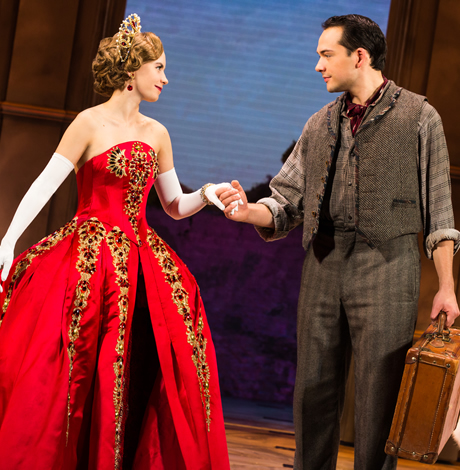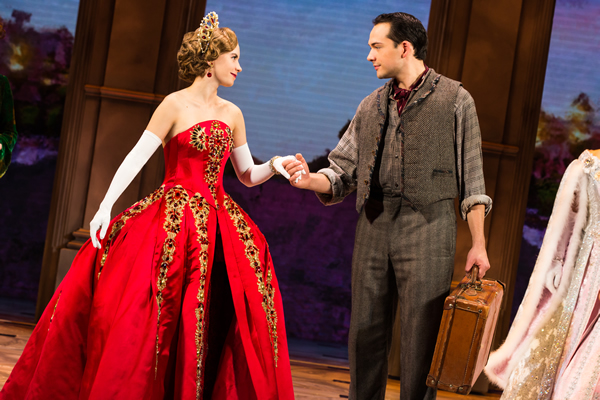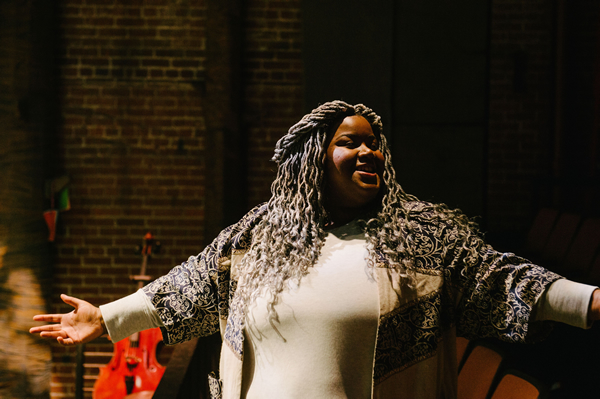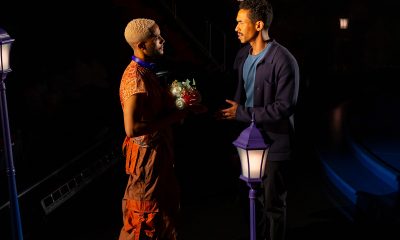Theater
Out actors shine in area productions ‘Anastasia,’ ‘As You Like It’
Jade Jones, Stephen Brower overcame insecurities to forge successful stage careers


Lila Coogan with Stephen Brower in the national tour of ‘Anastasia.’ (Photo by Evan Zimmerman)
‘Anastasia’
Through Nov. 25
The Kennedy Center
2700 F St., N.W.
$59-179
202-467-4600

Jade Jones in ‘As You Like It,’ at Keegan Theatre. (Photo by Cameron Whitman)
‘As You Like It’
Through Dec. 2
Keegan Theatre
1742 Church St., N.W.
$62
202-265-3767
Untraditional casting and breaking gender stereotypes on stage aren’t new concepts. And for younger out actors like Broadway vet Stephen Brower and local up-and-comer Jade Jones, it’s all part of the job. In recent interviews, the talented pair share their respective experiences.
As Dmitry, the young con man turned princely love interest in the national tour of “Anastasia” now at the Kennedy Center, Brower adds an unexpected vulnerability to the part that other actors might not. Still, as the leading man in the Stephen Flaherty and Lynn Aherns’ musical about the mystery surrounding the last tsar’s fabled daughter, Brower brings the chemistry and romance.
In his program bio, Brower, 25, thanks the production’s producers and creative team for their trust and open-mindedness.
“The guys who played Dmitri before me, Derek Clena and Zach Adkins, are traditional leading men — masculine, tall strapping guys,” he says. “Unlike them, I’m tall and skinny with bad posture. So when I auditioned for the part, I went in with my bag tricks. I was quirky and making jokes, but unafraid to show sensitivity. And they trusted my take on the role.”
Traditionally actors have been taught that leading men need to be sexually appealing to be successful, Brower says. “I’ve seen a lot of naturally sexy people get cast over more talented actors. I guess it has to do with ticket sales. As an actor, you face a challenge in being marketable while trying to be honest with yourself. My upbringing and background — being an opening gay man raised in conservative Tulsa, Oklahoma — has a lot do with what I bring to the part.”
Fortunately for actors who might come across as somewhat less than butch, things are changing Brower says. “We are currently in an age where can challenge those perceptions and I feel great to be a part of that. I honestly don’t think I would have been cast as Dimitri 10 years ago.
“Still,” he adds, “there remains a lingering fear that when you walk into an audition room that you have to put on that swagger to make them fall in love with you and casting directors only fall in love with guys who are hypermasculine. Most actors are plagued by insecurities. It’s important to me that stereotypes of leading men are changed.”
Growing up in Tulsa, Brower came out at 15.
“My family was very supportive and I think I knew they would be. What’s more I attended a diverse school. Magnet school for general education that created a loving and supportive environment.”
He went on to earn a degree in musical theater at Texas State University in three years before heading to New York City. Soon after, he landed a professional gig and has been employed ever since.
Prior to playing Dmitry, Brower toured with “Pippin” and “An American in Paris.” Luckily, he enjoys life on the road. His boyfriend, an actor/dancer, is touring with “Wicked.”
“We get together when our schedules permit. It’s tough but we manage. It’s part of what actors have to do.”
Jade Jones, 28, has played a hippy in “Hair” at Keegan Theatre, a munchkin in Ford’s Theatre “The Wiz” and recently that notorious meat piemaker Mrs. Lovett in Stephen Sondheim’s musical “Sweeney Todd” at Rep Stage in Howard County, an experience Jones describes as her principal accomplishment to date.
Currently Jones is playing Senior Duke in Keegan Theatre’s “As You Like It,” a pop/rock musical take on the Bard’s romantic comedy by New York singer/songwriter Shaina Taub. It’s the third time Jones has been cast in a role written for a man.
“It’s really interesting casting and makes me realize that the sky is the limit,” says Jones, who sums up her attitude in a quote attributed to African-American ballet dancer Lauren Anderson: “Do I fit this mold? No. There is no mold in art.”
In the spring, Jones tackles Little Red Ridinghood in Sondheim’s “Into the Woods” at Ford’s. Her future working wish list includes playing Tennessee William’s iconic creations Blanche Dubois and Stanley Kowalski (though not in the same production).
Like Stephen Brower, Jones is familiar with insecurities.
“I never believed I had what it took to be a musical theater actor. I initially felt that I needed to separate my acting and vocal careers,” says Jones who’s often singled out for her magnetic stage presence and powerful, soulful voice. “But then fellow actors explained to me how I could, and really should, do both together. I also had a fear of dancing. Fellow actors helped me with that too. I’ve been fortunate to work with some very supportive people. I consider them my mentors.”
On Monday at Keegan Theatre’s annual gala held in their charming performance space on Church Street in Dupont, Jones will receive the company’s Emerging Artist Award given to younger artists who have performed on the Keegan stage and shown particular promise and demonstrated a collaborative spirit, a dedication to their craft, an exceptional work ethic and an ever-deepening love for the art form. Keegan Theatre Associate Artistic Director Susan Marie Rhea says, “Jade is a true triple threat, a performer of the highest caliber. But she’s more than that — she has passion, vision for her career and a love for life and her fellow artists that makes her a true joy to be around.”
Jones, who is single and lives in Dupont, says receiving the award is like “coming full circle.” As a Fairfax County high school student, Jones was introduced to the works of Tennessee Williams with Keegan’s “A Streetcar Named Desire.”
“I was blown away. It’s the reason why I’m an actor. After graduating from Ferrum College in Virginia, my first professional acting job was at Keegan in ‘Hair.’ That they’re celebrating my work is very exciting.”
Coming out to her religious parents wasn’t easy. Being gay was condemned from the pulpit and her parents agreed with that.
“But they’ve changed since then. When I look at them now and the way they have accepted me and other family members and my friends, it makes be believe that there is positive light in this world despite everything. It’s not hard to be LGBTQ in the theater community,” she says. “I don’t think there’s any profession that’s more accepting. It’s where I’m most comfortable.”

‘A Wrinkle in Time’
Through July 20
Arena Stage
1101 Sixth St., S.W.
Tickets range from $59-$209
Arenastage.org
Currently at Arena Stage, talented out actor and singer Taylor Iman Jones is rekindling an old friendship with an adored character of fiction.
Broadway vet Jones is starring as 13-year-old Meg Murry in “A Wrinkle in Time,” the world-premiere musical adaptation of Madeleine L’Engle’s same-titled book.
For many readers, especially women, the classic 1962 young adult novel, was their first foray into sci-fi, particularly one with a female protagonist.
The story centers on Meg, an awkward schoolgirl whose physicist father has mysteriously disappeared. Now, Meg, her popular friend Calvin, and smart younger brother Charles Wallace are tasked with moving through time and space to find him. Along the way they encounter adventure and evil.
For Jones, 33, playing 13-year-old Meg feels freeing in ways. She says, “As you get older, you’re told to grow up, so I like letting go of some of that. To feel feelings in their rawest form and to tap back into that is fun. I like the spontaneity. There are highs and lows to revisit.”
Born and raised in the San Francisco Bay Area, Jones began piano lessons at just six and soon added band and plays to their pursuits. Following high school, she made a deep dive into California theater for seven years before making the big move to New York in 2017 where after just two months she was singing on Broadway.
The determined and appealing Jones, who lives in New York with their partner, boasts an impressive bio. She has appeared on Broadway as Catherine Parr, Henry VIII’s sixth and final wife in Six, and in the original casts of “Head Over Heels” and “Groundhog Day.” She’s been seen in national tours of “Hamilton” and “American Idiot.”
WASHINGTON BLADE: It seems “A Wrinkle in Time” and Meg mean a lot to a lot of people.
TAYLOR IMAN JONES: The book tells the story of a girl with so much undiscovered power who’s accomplishing things she never imagined that she could.
BLADE: Can you relate?
JONES: Meg wears her emotions on her sleeve. I can certainly relate to that. I’m a Pisces. Sometimes being hyperemotional and very empathetic can feel like a burden, but as I’ve matured, I have realized that it’s not a bad quality. And it’s something I’ve learned to harness and to enjoy. I love that I can play a role like Meg in front of thousands of people.
BLADE: Was “Wrinkle in Time” a book you knew well?
JONES: Oh yeah, it’s a favorite book that lives in my heart and my mind. It’s one of the first books that taught me about the adventure of reading.
BLADE: And playing a favorite character must be a kick.
JONES: It really is.
BLADE: Meg is a big part in a big show.
JONES: This musical is huge. They’re traveling through space and meeting people on different planets. 20-person cast. 30 songs in the show. Quite the undertaking and I’m proud of us. I’m on stage for the entire musical and I sing four or five numbers.
As a mezzo soprano I guess you’d say I have the luxury of being able to do a lot of musicals that span a lot of different genres: rock musical, pop musical, and standards. “A Wrinkle in Time” is contemporary musical theater.
For me, singing is probably the least difficult part of the show. What’s harder for me is the way Meg experiences trauma; I need to be careful when I’m screaming and yelling.
BLADE: It seems mostly women have been involved in making this production happen (book by Lauren Yee; music and lyrics by Heather Christian; directed by Lee Sunday Evans; and choreography by Ani Taj.)
JONES: It’s true, the director, writer, etc., and most of our producers are all women. This doesn’t happen most of the time. For me it means new ideas and fresh energy, and pushing the limits of musical theater.
It’s also created a wonderful space in which to work. It can be more generous, and understanding. And centering the story on a young girl is something we can all relate to.
BLADE: Will “A Wrinkle in Time” resonate with queer theatergoers and their families?
JONES: I think so, especially on the heels of pride month. It’s truly a show for all ages about finding your inner strength and fighting for the things that you love; not letting evil win over the power of good, and not just for yourself but for those around you too.
Theater
‘Andy Warhol in Iran’ a charming look at intersection of art, politics
Mosaic production plumbs kidnapping plot of iconic artist for humor

‘Andy Warhol in Iran’
Through July 6
Mosaic Theater Company at Atlas Performing Arts Center
1333 H St., N.E., WDC
$70
Mosaictheater.org
Behind the blasé veneer, Andy Warhol was more curious than people knew. Particularly when it came to money. He kept a close eye on how the ultra-rich lived, what fellow artists were being paid and who was paying them, and, of course, all the new and more saleable ways of making and selling art.
In playwright Brent Askari’s “Andy Warhol in Iran,” now playing at Mosaic Theater Company, Warhol (Alex Mills) is brought outside of his usual area of interest when he lands face to face with a young revolutionary. While Warhol could be artistically revolutionary, he didn’t connect with the idea of forgoing the pursuit of money and fame for the infinitely more difficult task of achieving social justice.
The 90-minute play is not fully factual, but rather inspired by Warhol’s real life 1976 trip to Tehran to make portraits of the royal Pahlavi family in the waning days of their reign, with a focus on Farah Diba, the Shah’s elegant wife and Iran’s last empress.
The action unfolds in a Tehran hotel suite boasting a glorious view of the snowcapped Alborz Mountains not far from Iran’s vibrant and bustling capital. It’s here, disguised as room service, that Farhad (played by Nathan Mohebbi) gains entrance to Warhol’s rooms, seeking to kidnap the pop art star to garner attention for the university students’ movement.
Warhol meets the armed intruder with a sort of wide-eyed wonderment, flummoxed why he has been selected for abduction. Warhol can’t understand why a young man like Farhad wouldn’t prefer to be paid a big ransom on the spot, or be cast as a star in one of the Warhol Factory flicks.
When Farhad replies it’s because Warhol is the most decadent artist in the world, Warhol mistakenly takes it for the ultimate compliment. After all, his biggest successes had been connected to celebrity and consumerism (think Campbell’s Soup Cans. 1962).
For Warhol, decadence is aspirational. He made portraits of financiers, movie stars, and jet setters. In fact, he’d been obsessed with the lives of the rich and famous since he was a small kid in Pittsburgh thumbing through Photoplay Magazine while bed bound with Saint Vitus Dance.
Accompanying Warhol to Tehran (unseen) are his business manager Fred Hughes, and Bob Colacello, editor of Interview magazine. Together, they make a merry trio of gay social climbers. These kinds of trips were a boon to the artist. Not only did they solidify a new strata of high society contacts, but were also superbly lucrative, thickly padding the painter’s pockets.
While in Iran, Warhol wanted only to view Farah’s vast world-class collection of jewels, sample the caviar on tap, and get his Polaroids. Then he’d fly first class back to New York and transfer the images to silk screen and sell the portraits to the Persian royals at a hefty price. He didn’t foresee any obstacles along the way.
Serge Seiden’s direction is spot on. He’s rendered a wonderfully even two-hander with a pair of terrifically cast actors. And Seiden plumbs the piece for humor mostly drawn from the absurdity of the situation without missing any of the serious bits.
As Warhol, out actor Mills is instantly recognizable as the eccentric artist. He’s wearing the button-down shirt, jeans, blazer, glasses, and, of course the famed shock of white hair wig (here a little more Karen than Andy). His portrayal is better than an imitation. He gives a bit of the fey and confused, but has also infuses him with a certain dynamism.
The energy works well with the intensity of Mohebbi’s would-be kidnapper Farhad. And while it isn’t a romance, it’s not impossible to think that Warhol might fall for a handsome male captor.
The connection between art and politics is almost always interesting; and though not a super deep dive into the era or the life of an artist, “Andy Warhol in Iran” is a compelling, charming, and sometimes funny glimpse into that intersection.
Theater
‘Hunter S. Thompson’ an unlikely but rewarding choice for musical theater
‘Speaks volumes about how sad things land on our country’

‘The Untitled Unauthorized Hunter S. Thompson Musical’
Through July 13
Signature Theatre
4200 Campbell Ave., Arlington, Va.
$47 to $98
Sigtheatre.org
The raucous world of the counterculture journalist may not seem the obvious choice for musical theater, but the positive buzz surrounding Signature Theatre’s production of Joe Iconis’s “The Untitled Unauthorized Hunter S. Thompson Musical” suggests otherwise.
As the titular, drug addled and gun-toting writer, Eric William Morris memorably moves toward his character’s suicide in 2005 at 67. He’s accompanied by an ensemble cast playing multiple roles including out actor George Salazar as Thompson’s sidekick Oscar “Zeta” Acosta, a bigger than life Mexican American attorney, author, and activist in the Chicano Movement who follows closely behind.
Salazar performs a show-stopping number — “The Song of the Brown Buffalo,” a rowdy and unforgettable musical dive into a man’s psyche.
“Playing the part of Oscar, I’m living my Dom daddy activist dreams. For years, I was cast as the best friend with a heart of gold. Quite differently, here, I’m tasked with embodying all the toxic masculinity of the late ‘60s, and a rampant homophobia, almost folded into the culture.”
He continues, “My sexuality aside, I like to think that Oscar would be thrilled by my interpretation of him in that song.
“Our upbringings are similar. I’m mixed race – Filipino and Ecuadorian and we grew up similarly,” says Salazar, 39. “He didn’t fit in as white or Mexican American, and fell somewhere in the middle. Playing Oscar [who also at 39 in 1974 forever disappeared in Mexico], I pulled out a lot of experience about having to code switch before finally finding myself and being confident just doing my own thing.
“As we meet Oscar in the show we find exactly where’s he’s at. Take me or leave me, I couldn’t care less.”
In 2011, just three years after earning his BFA in musical theater from the University of Florida in Gainesville, Salazar fortuitously met Iconis at a bar in New York. The pair became fast friends and collaborators: “This is our third production,” says George. “So, when Joe comes to me with an idea, there hasn’t been a moment that I don’t trust him.”
In “Be More Chill,” one of Iconis’s earlier works, Salazar originated the role of Michael Mell, a part that he counts as one of the greatest joys of artistic life.
With the character, a loyal and caring friend who isn’t explicitly queer but appeals to queer audiences, Salazar developed a fervent following. And for an actor who didn’t come out to his father until he was 30, being in a place to support the community, especially younger queer people, has proved incredibly special.
“When you hear Hunter and Oscar, you might think ‘dude musical,’ but I encourage all people to come see it.” Salazar continues, “Queer audiences should give the show a shot. As a musical, it’s entertaining, funny, serious, affecting, and beautiful. As a gay man stepping into this show, it’s so hetero and I wasn’t sure what to do. So, I took it upon myself that any of the multiple characters I play outside of Oscar, were going to be queer.
Queer friends have seen it and love it, says Salazar. His friend, Tony Award-winning director Sam Pinkleton (“Oh, Mary!”) saw Hunter S. Thompson at the La Jolla Playhouse during its run in California, and said it was the best musical he’d seen in a very long time.
“Since the work’s inception almost 10 years ago, I was the first Oscar to read the script. In the interim, the characters’ relationships have grown but otherwise there have been no major changes. Still, it feels more impactful in different ways: It’s exciting to come here to do the show especially since Hunter S. Thompson was very political.”
Salazar, who lives in Los Angeles with his partner, a criminal justice reporter for The Guardian, is enjoying his time here in D.C. “In a time when there are so many bans – books, drag queens, and travel — all I see is division. This is an escape from that.”
He describes the Hunter Thompson musical as Iconis’s masterpiece, adding that it’s the performance that he’s most proud of to date and that feels there a lot of maturity in the work.
“In the play, Thompson talks to Nixon about being a crook and a liar,” says Salazar. “The work speaks volumes about how sad things land on our country: We seem to take them one step forward and two steps back; the performance is almost art as protest.”
-

 U.S. Supreme Court3 days ago
U.S. Supreme Court3 days agoSupreme Court to consider bans on trans athletes in school sports
-

 Out & About3 days ago
Out & About3 days agoCelebrate the Fourth of July the gay way!
-

 Virginia3 days ago
Virginia3 days agoVa. court allows conversion therapy despite law banning it
-

 Federal Government5 days ago
Federal Government5 days agoUPenn erases Lia Thomas’s records as part of settlement with White House












